| Organic Seeds | Edible Plants | Organic Pest Controls | Books | Tools, Propagation & Fertilisers | Sprouting & Microgreens | Poultry Supplies | Specials & Gift Ideas |

Top

We will send an email to this address*
when is next available
* we will use this email address only for this notification and then we will delete it.
 Home
Home
Green Harvest Organic Gardening Supplies is permanently closed as of 5pm on 1-11-2023.
We will not be taking orders by this website, in person, by phone or email. Our display garden and retail shop are closed forever.
Read more...
Phone:07 54357000
Phone calls will only be responded to sporadically and only in reference to orders placed prior to 2-11-2023. All the useful growing and organic pest management research and resources are available on this website for a while still.
Chook Housing
Whereabouts
Site your chook house with the following in mind:
Site your chook house with the following in mind:
- Good drainage
- Sheltered from weather extremes but well-lit and airy
- Close enough to the house for easy access
- Close to a tap or tank
Housing Types
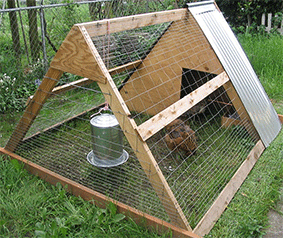 Each adult bird needs between 0.2 and 0.4 m2 of floor space, so you will need to decide on how many chooks you want to keep. Three
is a minimum because chooks like company; more than a dozen and you will need to start selling eggs. Six is a good number for an average family.
Don't consider keeping a rooster unless you have more than 10 hens.
Each adult bird needs between 0.2 and 0.4 m2 of floor space, so you will need to decide on how many chooks you want to keep. Three
is a minimum because chooks like company; more than a dozen and you will need to start selling eggs. Six is a good number for an average family.
Don't consider keeping a rooster unless you have more than 10 hens.
Mobile Chicken Tractors
These are useful to keep a small number of birds, 2 - 3 full size or 5 - 6 bantams. The main problem is they can get very hot during summer, so it is important to have a very shady spot available and a constant water supply. They can also be heavy and awkward to move and it is worth checking this out carefully before purchasing one. They work best in urban areas which are less likely to have carpet snakes or foxes visiting during the night.
Ready-made Metal Sheds or Chicken Coops
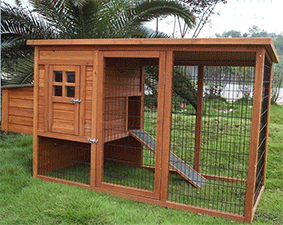 These can be a good choice for a small number of birds but check there is cross-ventilation. Make sure there are no gaps where the wall meets
both the floor and the roof, in order to keep out rodents and snakes.
These can be a good choice for a small number of birds but check there is cross-ventilation. Make sure there are no gaps where the wall meets
both the floor and the roof, in order to keep out rodents and snakes.
Permanent Housing
A good hen house will provide shelter from cold winds and rain and give shade on hot days. Concrete floors are best as they restrict habitat for mice and rats and are easy to clean and stay dry. Cover the floor with a 6 cm layer of sawdust, shredded newspaper, pine needles, wood shavings or straw to make it easier to clean. Avoid using any treated timber in the construction. It is worthwhile insulating the roof.
 Each adult bird needs between 0.2 and 0.4 m2 of floor space, so you will need to decide on how many chooks you want to keep. Three
is a minimum because chooks like company; more than a dozen and you will need to start selling eggs. Six is a good number for an average family.
Don't consider keeping a rooster unless you have more than 10 hens.
Each adult bird needs between 0.2 and 0.4 m2 of floor space, so you will need to decide on how many chooks you want to keep. Three
is a minimum because chooks like company; more than a dozen and you will need to start selling eggs. Six is a good number for an average family.
Don't consider keeping a rooster unless you have more than 10 hens.Mobile Chicken Tractors
These are useful to keep a small number of birds, 2 - 3 full size or 5 - 6 bantams. The main problem is they can get very hot during summer, so it is important to have a very shady spot available and a constant water supply. They can also be heavy and awkward to move and it is worth checking this out carefully before purchasing one. They work best in urban areas which are less likely to have carpet snakes or foxes visiting during the night.
Ready-made Metal Sheds or Chicken Coops
 These can be a good choice for a small number of birds but check there is cross-ventilation. Make sure there are no gaps where the wall meets
both the floor and the roof, in order to keep out rodents and snakes.
These can be a good choice for a small number of birds but check there is cross-ventilation. Make sure there are no gaps where the wall meets
both the floor and the roof, in order to keep out rodents and snakes.Permanent Housing
A good hen house will provide shelter from cold winds and rain and give shade on hot days. Concrete floors are best as they restrict habitat for mice and rats and are easy to clean and stay dry. Cover the floor with a 6 cm layer of sawdust, shredded newspaper, pine needles, wood shavings or straw to make it easier to clean. Avoid using any treated timber in the construction. It is worthwhile insulating the roof.
Chook Run
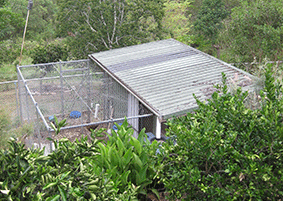 This is a secure outside area, attached to the chook house. It needs to be a completely meshed enclosure, including the top. Otherwise you'll
see crows flying off with eggs in their beaks, goannas eating eggs for breakfast and you'll be providing grain for every feathered friend in
the neighbourhood!
If the chooks are likely to be locked in this run for long periods because the owners are away for the weekend, then the run needs to be at
least 4 times the size of the shed.
This is a secure outside area, attached to the chook house. It needs to be a completely meshed enclosure, including the top. Otherwise you'll
see crows flying off with eggs in their beaks, goannas eating eggs for breakfast and you'll be providing grain for every feathered friend in
the neighbourhood!
If the chooks are likely to be locked in this run for long periods because the owners are away for the weekend, then the run needs to be at
least 4 times the size of the shed.
 This is a secure outside area, attached to the chook house. It needs to be a completely meshed enclosure, including the top. Otherwise you'll
see crows flying off with eggs in their beaks, goannas eating eggs for breakfast and you'll be providing grain for every feathered friend in
the neighbourhood!
If the chooks are likely to be locked in this run for long periods because the owners are away for the weekend, then the run needs to be at
least 4 times the size of the shed.
This is a secure outside area, attached to the chook house. It needs to be a completely meshed enclosure, including the top. Otherwise you'll
see crows flying off with eggs in their beaks, goannas eating eggs for breakfast and you'll be providing grain for every feathered friend in
the neighbourhood!
If the chooks are likely to be locked in this run for long periods because the owners are away for the weekend, then the run needs to be at
least 4 times the size of the shed.
Protection From Predators
Chooks sadly have a wide range of predators, from the hawks that take them during the day and the carpet snakes, quolls and foxes that prey on them at night. Predators that are active at night will also attack the hens on dark overcast days. Goannas are very fond of eggs and will take small chicks. A safe, secured place to roost at night is vital to keeping your flock alive; during the day a good fence will keep out wild dogs. Trees and shrubs will give them shelter from aerial predators.
Keeping food away from rats, mice and other birds is important for the health of the flock. All of these carry diseases that may impact your birds.
Chooks sadly have a wide range of predators, from the hawks that take them during the day and the carpet snakes, quolls and foxes that prey on them at night. Predators that are active at night will also attack the hens on dark overcast days. Goannas are very fond of eggs and will take small chicks. A safe, secured place to roost at night is vital to keeping your flock alive; during the day a good fence will keep out wild dogs. Trees and shrubs will give them shelter from aerial predators.
Keeping food away from rats, mice and other birds is important for the health of the flock. All of these carry diseases that may impact your birds.
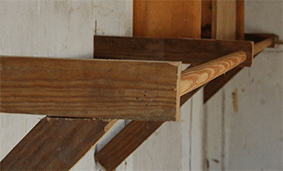 Perches
PerchesRound, smooth perches are best; a size that they can curl their toes around for grip. Perches should start at 60cm from the ground and move up in height like a ladder to 100cm. An old wooden ladder can be recycled as a perch if propped at a suitable angle. Metal perches are good as they do not provide habitat for lice.
Nest Boxes
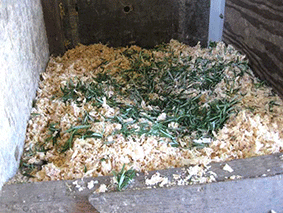 Nests should be in the darkest, coolest part of the chook shed. Line them with wood shavings or straw and clean them regularly. Recycling a
mower catcher from the tip works well as parasites won't find a home in the metal or plastic sides. Dusting the floor of the nest-box with
diatomaceous earth
will help prevent lice and mites.
Nests should be in the darkest, coolest part of the chook shed. Line them with wood shavings or straw and clean them regularly. Recycling a
mower catcher from the tip works well as parasites won't find a home in the metal or plastic sides. Dusting the floor of the nest-box with
diatomaceous earth
will help prevent lice and mites.
If your garden includes herbs, it is worth considering adding them to the nest boxes. Wild birds have been observed bringing herbs with strong smelling, volatile, essential oils to their nests. The herbs have beneficial antibacterial, insecticidal and miticidal properties.
Broody hens don't get out to dust bathe often and so are more prone to get mites and parasites; fresh or dried herbs among the nesting material can help protect them from those pests. The newly hatched chicks can eat the herbs and also benefit by rubbing against these herbs in the first few days.
Try rosemary, sage, lavender, bergamot, feverfew, catnip, oregano, peppermint or wormwood to repel insects and other pests.
Warning: pennyroyal is poisonous to chickens.
 Nests should be in the darkest, coolest part of the chook shed. Line them with wood shavings or straw and clean them regularly. Recycling a
mower catcher from the tip works well as parasites won't find a home in the metal or plastic sides. Dusting the floor of the nest-box with
diatomaceous earth
will help prevent lice and mites.
Nests should be in the darkest, coolest part of the chook shed. Line them with wood shavings or straw and clean them regularly. Recycling a
mower catcher from the tip works well as parasites won't find a home in the metal or plastic sides. Dusting the floor of the nest-box with
diatomaceous earth
will help prevent lice and mites.If your garden includes herbs, it is worth considering adding them to the nest boxes. Wild birds have been observed bringing herbs with strong smelling, volatile, essential oils to their nests. The herbs have beneficial antibacterial, insecticidal and miticidal properties.
Broody hens don't get out to dust bathe often and so are more prone to get mites and parasites; fresh or dried herbs among the nesting material can help protect them from those pests. The newly hatched chicks can eat the herbs and also benefit by rubbing against these herbs in the first few days.
Try rosemary, sage, lavender, bergamot, feverfew, catnip, oregano, peppermint or wormwood to repel insects and other pests.
Warning: pennyroyal is poisonous to chickens.
 Home
Home
Green Harvest Organic Gardening Supplies is permanently closed as of 5pm on 1-11-2023.
We will not be taking orders by this website, in person, by phone or email. Our display garden and retail shop are closed forever.
Read more...
Phone:07 54357000
Phone calls will only be responded to sporadically and only in reference to orders placed prior to 2-11-2023. All the useful growing and organic pest management research and resources are available on this website for a while still.
No liability will be accepted by Green Harvest, its owners or employees as to the accuracy of any information. No responsibility will be taken for damage to property or persons due to information given about a product or technique. No responsibility will be taken for the loss of a crop or income due to information given about a product or technique.
 Shopping here is private and secure.
Shopping here is private and secure.
Copyright © 2001 - 2024 Green Harvest Organic Gardening Supplies
No part of this website may be reproduced without permission of the owner